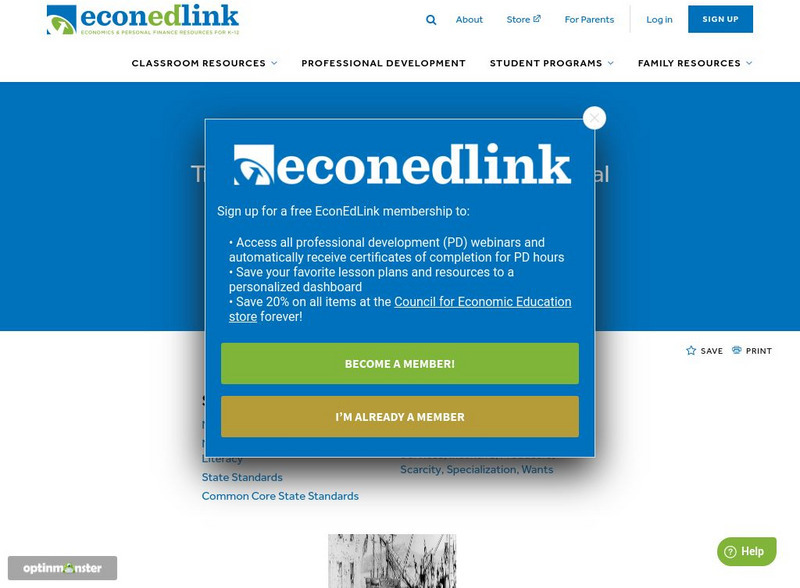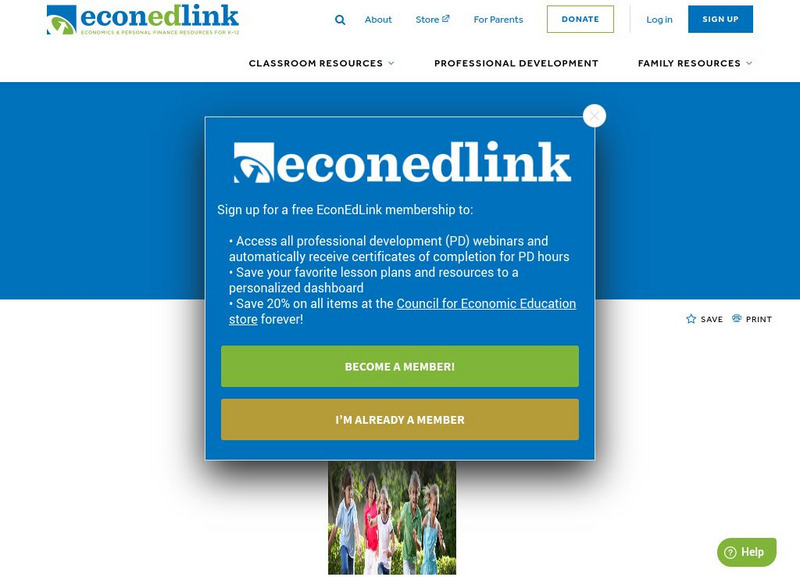TED Talks
Ted: Ted Ed: How Do We Separate the Seemingly Inseparable?
Your cell phone is mainly made of plastics and metals. It's easy to appreciate the process by which those elements add up to something so useful. But there's another story we don't hear about- how did we get our raw ingredients in the...
TED Talks
Ted: Ted Ed: What Is a Gift Economy?
What if, this holiday season, instead of saying "thank you" to your aunt for her gift of a knitted sweater, the polite response expected from you was to show up at her house in a week with a better gift? Or to vote for her in the town...
Council for Economic Education
Econ Ed Link: Babysitter Shortage in Washington, d.c.
What is responsible for the shortage of babysitters in Washington, DC? Identify the parts of the article which indicate a decrease in supply and an increase in demand.
Council for Economic Education
Econ Ed Link: Every Penny Counts
Lesson that helps learners understand that people must make choices about the goods and services they purchase. Students recognize the prices indicate what people pay for goods and services, learn to compare prices, and understand that...
Council for Economic Education
Econ Ed Link: Free Ride
Free Ride helps students identify goods and services provided by the government and evaluate the cost of government provided goods and services.
Utah Education Network
Uen: Everyone Works
Lesson that helps students understand the economic concepts of goods and services. Students categorize economic activities as goods or services, and discuss the goods and services exchanged in If You Give a Mouse a Cookie by Laura Jaffe...
Read Works
Read Works: What Can I Buy?
[Free Registration/Login Required] An informational text about how money can be used to buy both goods and services. A question sheet is available to help students build skills in reading comprehension.
Council for Economic Education
Econ Ed Link: The Mystery of Is It Mine or Ours? (Student Version)
Check out this informative economics website. "In this lesson, you will learn why some goods are considered to be 'private' goods and others are considered to be 'public' goods." This site contains an interactive activity.
Council for Economic Education
Econ Ed Link: Community Helpers at Your Service
Show elementary students the correlation between goods and services and consumers. "You will draw a picture of a community helper, and perhaps write some sentences about him or her, to show or tell how that helper provides a Service."
Council for Economic Education
Econ Ed Link: Changes in Change
This lesson begins with students visiting one web resource that gives them practice in counting money. The second resource goes one step further in that students are given opportunities to make change for make-believe purchases.
Council for Economic Education
Econ Ed Link: Old Business, New Business
In this lesson students are introduced to several businesses from the past. They see that, while the names for these businesses are different, many of the elements of that job are seen in occupations today. The web site, "Business Cards"...
Council for Economic Education
Econ Ed Link: Hey, Mom! What's for Breakfast?
In this lesson students working in cooperative groups will: 1.Discuss food items they consume for breakfast. 2.Investigate elements of foreign culture, particularly food. 3.Use map skills to locate selected foreign nations. 4.Increase...
Council for Economic Education
Econ Ed Link: Bill, Are You Bogus?
In a barter system, people have to trade goods and services for other goods and services. In an economy that produces millions of goods and services, barter is very difficult. Think of all the stuff (goods and services) you have.
Council for Economic Education
Econ Ed Link: No Fireworks on the 4th of July
This lesson explores the differences between public and private goods.
Council for Economic Education
Econ Ed Link: To Buy or Not to Buy
While precise numbers are not known, it is believed the number of boycotts has grown markedly in the past fifty years. Consumers seem to be besieged by requests from special interest groups to refrain from buying certain goods and...
Council for Economic Education
Econ Ed Link: Trouble Is Brewing in Boston: "Colonial Voices Hear Them Speak"
It's December 16, 1773 and many of the citizens of Boston are furious with King George's new tax on tea. Young Ethan, a printer's errand boy, has been given the task of conveying information concerning an upcoming protest meeting. As he...
Council for Economic Education
Econ Ed Link: We Are Consumers and Producers
This lesson plan is geared toward beginning economics concepts. "In this lesson you are going to learn more about how you and others are consumers and producers."
Auburn University
Auburn University: A Glossary of Political Economy Terms: Public Goods Defined
This site is an excellent explanation of the economic concept of public goods. The Auburn University site is part of a dictionary of political economic terms.
Council for Economic Education
Econ Ed Link: I Have No Money, Would You Take Wampum?
Through the use of folk tales, history, and the students' own experiences, students will recognize the inter-relatedness of goods, services, money. They will locate information about barter as a means of trade, use folk tales as an...
Council for Economic Education
Econ Ed Link: Frontier Specialists
The level of output in an economy can be increased through specialization. Economic specialization occurs when people produce different goods and services than they consume. It requires people to exchange goods and services.
Council for Economic Education
Econ Ed Link: The Mystery of Is It Mine or Ours? (Educator Version)
Did you ride to school on a road today? Yesterday did you skate in a public park? Maybe Mom or Dad traveled home from one of your ball games on their bicycles under a string of street lights? How did the road, the park or the street...
Council for Economic Education
Econ Ed Link: China Where Will They Fit in the World Economy?
With its emerging middle class, its new markets, and a new emphasis on increasing its technology base, where is China going to fit in the world economy?
Council for Economic Education
Econ Ed Link: Old Toy New Market
Students explore the LEGOLAND theme parks and demonstrate an understanding of how new markets can be created and that cultural and social differences can affect these markets.
Council for Economic Education
Econ Ed Link: Lessons: Community Helpers Are at Your Service
Lesson that introduces students to the people who provide services to the community. Students understand the difference between goods and services, and brainstorm the people who provide services in their community. Includes links to...












